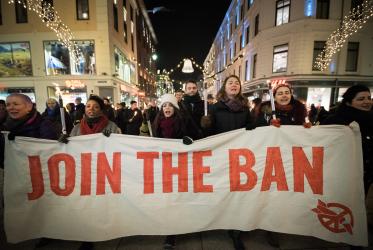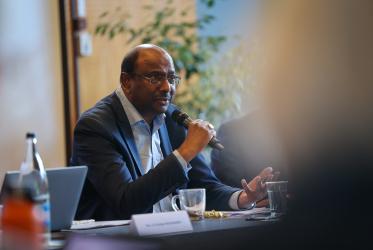Below, Bishop Cocksworth reflects on how his church and churches everywhere can help lead the world on a path of peace and reconciliation in which past atrocities of mass destruction are never repeated.
What special significance does the new treaty have for the church and people of Coventry in light of your history?
Bishop Cocksworth: In the heart of Coventry we have a stark reminder of humanity’s potential for destruction: a great Cathedral reduced to ruins in one night of bombing on 14 November 1940, 80 years ago. There’s other evidence of that night of horror and other nights of bombing in the city, of course. But the ruined Cathedral is the city’s – perhaps the country’s – starkest reminder of this atrocity by the war’s weapons of destruction. It meant that, the Cathedral, with its ministry of peace and reconciliation, has been at the forefront of shaping and articulating the city’s own journey of reconciliation and peacebuilding over the past 80 years.
That work of the gospel has enabled the city of Coventry to be not only a potent symbol of the destruction war brings but also, through both the remarkable relationships it has built with German cities also destroyed in war and the dramatic impact of its new Cathedral, a sign of hope in the world. Coventry can speak with authority about the path of peace and reconciliation to a better world where such atrocities are never repeated.
The UN Treaty on the Prohibition of Nuclear Weapons (TPNW) is the first multilateral and legally-binding instrument for nuclear disarmament to have been negotiated in 20 years. It marks a turning point by redefining global attitudes to nuclear weapons and establishing a new international norm. From now on, the very possession of nuclear weapons will be widely regarded as both immoral and illegal, and the conversation on nuclear weapons will be driven above all by humanitarian, rather than strategic, concerns.
The best deterrence to war is the gift of peace itself. That’s the witness of Coventry. So I was delighted that the statement welcoming the TPNW was published to coincide with the 80th Anniversary of Coventry’s Blitz.
What reaction has there been so far to the statement, in the church, media and society, and from the government?
Bishop Cocksworth: The statement was also published in a letter in a national Sunday newspaper, with a supportive article built around it. And a number of church-based organisations have welcomed it. But there’s much more work to do with the media, church and society generally.
The government, in response, has restated its commitment to the nuclear deterrent and has rejected the TPNW as failing ‘to offer a realistic path to nuclear disarmament’ and risking ‘undermining the effective non-proliferation and disarmament architecture which we already have in place.’
I disagree. The appetite for the TPNW grew out of a dissatisfaction with the slow progress of the UN Treaty on the Non-Proliferation of Nuclear Weapons (NPT). Not a single multilateral disarmament negotiation has ever been held under the NPT. The TPNW does not stand in contradiction of the NPT; rather, the TPNW complements, strengthens, and will ultimately complete the normative agenda of the NPT.
To have so many leading bishops join in making such a statement sends a very powerful message. Why is it so important to the Church of England that the UK Government joins the Treaty on the Prohibition of Nuclear Weapons?
Bishop Cocksworth: It is worth noting that although the Church of England has engaged quite extensively with the debate on nuclear weapons over the past decades, the church continues to hold a variety of views on the matter, from ‘pacifist’ to ‘realist’ arguments inspired by just war theory.
So the statement doesn’t claim to be a policy announcement on behalf of the Church of England as a whole. It’s simply an expression of conviction by 30 bishops including both of our archbishops. For my part, I hope that the synodical processes of the church will be inspired by the clear position we’ve taken, and will follow our lead.
There’s certainly widespread agreement in the Church of England, and among Christians more broadly, that nuclear weapons are uniquely terrible. For some, this favours an argument for deterrence. For others of us, the unique horror of nuclear weapons makes their total prohibition a moral imperative.
I believe it’s especially important that the UK Government joins the Treaty. For an established nuclear power – which is actively modernising its nuclear arsenal – to join the Treaty, would send an immensely powerful message to the rest of the world, and especially to NATO and other P5 countries.
Rather than diminish our standing in the global order, as critics argue, such a brave and radical move would be a tangible expression of our national self-confidence as we forge a new role for ourselves in the world, and would send a message of solidarity to the 122 countries who have already signed the Treaty. It would be precisely the right kind of exceptionalism, and an articulation of our moral power and sense of global responsibility. Indeed, the UK is already taking a lead with respect to the most pressing threats to global stability and security, including the coronavirus pandemic, climate change (through policy commitments and our hosting of COP26) and terrorism. These are the real threats of the 21st century and dealing with them will require a new world vision. Relics of a mid-twentieth-century Cold War are not part of the solution.
Moreover, besides reimagining our global role, we will be in a position to invest heavily in many aspects of our domestic life – health, education, transport, etc. – with the vast sums of money which would be saved.
Joining the Treaty would be much more than an act of symbolism on the UK’s part, just as the Treaty itself will be much more than merely symbolic, contrary to criticisms which suggest as much. Besides shaping a new international norm on nuclear weapons, it makes several new requirements of its signatories, and is therefore broader in scope than the NPT. For instance, it includes ground-breaking requirements to provide assistance to victims of nuclear weapons use and testing – the first time that international law has mandated that countries address this most destructive form of humanitarian devastation.
In the UK, how broad is general public support for the idea of nuclear deterrence, and how can the church help address this concern?
Bishop Cocksworth: The last time the debate on nuclear weapons was firmly embedded in the public arena was in 2016 when parliament was due to vote on the renewal of Trident (the UK’s nuclear deterrence programme). At the time, around two-thirds of the general public supported prime minister Theresa May’s statement that she would be prepared to launch a strike if necessary. However, only 52% supported the principle of having nuclear weapons in the first instance, and only 44% supported Trident renewal.
So, while it’s too early to detect a decisive shift in the public mood against nuclear weapons, the public is far from wholeheartedly in favour of the idea. The church is well-placed to help society to reengage with this debate and to curate courageous conversations on the subject. We need to be encouraging people to consider the moral and ethical implications of the doctrine of deterrence. We need to expand the debate beyond questions of the acceptability of their use – either in practice, or as a deterrence – and to draw attention to the many other ways in which the debate on nuclear weapons can be cast – in particular, casting more light on the humanitarian and moral questions associated with the possession of nuclear weapons, something that should be stigmatised in and of itself. The deterrence doctrine is built upon the premise that – as Theresa May admitted in 2016 – governments must be prepared to use nuclear weapons. If we can come to see the existence of nuclear weapons as intrinsically harmful and morally repulsive, then the argument for their maintenance as a deterrence will lose credibility.
What plans do you and your fellow bishops have to follow up on this statement, especially vis-à-vis the UK Government?
Bishop Cocksworth: We intend to press the government further on the matter, particularly in the House of Lords (the upper house of our parliament) where some of us, myself included, are members.
We also plan to press the UK Government to engage more constructively with the Non-Proliferation Treaty Review conference scheduled to take place in August 2021.
As a nuclear power, what steps should the UK take as far as its own nuclear weapons are concerned?
Bishop Cocksworth: The UK should reconsider its commitment to renewing Trident and should ultimately seek to abandon its policy of nuclear deterrence. We should seize this moment when we are re-imagining our place in the world, and when the world is re-imagining its order, to do this. It’s worth noting that to forge this new role in this way is by no means incompatible with our membership of NATO.
Realistically, a change of course from the current UK Government is not immediately on the horizon. But, because the implications of the Treaty will be radical, I’m confident that, in time, pressure will mount on states which possess nuclear weapons. With this Treaty, we see most nations on earth declaring a conviction that nuclear weapons are dangerous and should be eliminated. The fact every signatory of the TPNW is a country without nuclear weapons, is itself a clear indicator of our direction of travel. For years we have heard concerns that countries with emerging economies and growing populations would inevitably seek to develop their own nuclear arsenals. However, of the top 10 most populated countries in the world, there are five that are in this Treaty. Rising global players such as Nigeria, which might have been expected to develop a nuclear capacity, have instead decided that the very possession of nuclear weapons is a fundamental threat to global stability and our common safety.
What can Coventry Cathedral contribute to the task, with the worldwide relationships it has developed since the destruction of the Cathedral in the Second World War and its subsequent rebuilding?
Bishop Cocksworth: Coventry Cathedral, and the narrative of peace and reconciliation which it has embedded in the city itself, continues to speak a word of hope to the world. The ruins stand as a permanent reminder of the horror of war. The new Cathedral rises out of the rubble of the past as a beacon of light for a better world, where enemies have become friends. The Cathedral’s simple prayer, ‘Father, forgive’ (not forgive ‘them’, for only Jesus can say that, but forgive us all), its international Community of the Cross of Nails, the reconciliation it has inspired between peoples and cities, its capacity to speak to every human being who has suffered in conflict and its reaching out for a new future, provide powerful theological, relational and symbolic tools to reshape imagination, to inspire hope and to help build a new global consensus in which the use of nuclear weapons is simply unthinkable. The point at which their use is unthinkable will be the point at which the argument for deterrence no longer stands.









